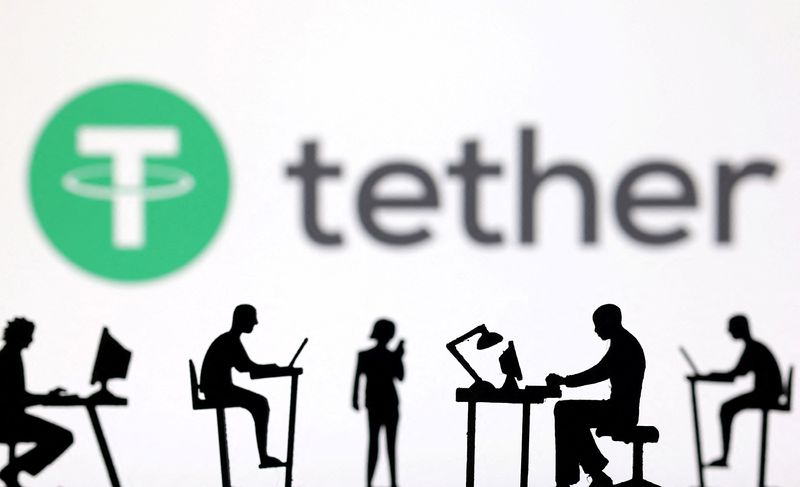By Federico Maccioni and Catherine Cartier
DUBAI (Reuters) -Cryptocurrency company Tether said on Wednesday it would launch a new stablecoin pegged to the United Arab Emirates (UAE) dirham as it taps demand for the Gulf currency and seeks to offer alternatives to the U.S. dollar.
Stablecoins are digital tokens designed to keep a constant value backed by traditional currencies such as the U.S. dollar or euro. They have seen rapid growth, both as a form of payment and among traders wanting to buy and sell cryptocurrencies such as bitcoin outside of the regulated banking system.
Tether runs the world's biggest stablecoin with its eponymous dollar-pegged token (USDT), designed to maintain a value of $1.
The roughly $117 billion in circulation makes up the bulk of the $169 billion stablecoin market, according to CoinGecko data.
"The main purpose is actually creating an optionality towards the U.S. dollar," Tether CEO Paolo Ardoino said of the proposed dirham-pegged unit during an event in Dubai, adding that he believed the dirham would become a preferred currency as global trade shifts.
"We see a lot of interest in holding AED (dirham) outside of the UAE," he said, citing the stability and safety of both the country and its balance sheet.
The dirham, like most Gulf currencies, is pegged to the U.S. dollar.
The UAE is pushing to become a global hub for the crypto industry as economic competition heats up in the Gulf region.
It has been quick to enable cryptocurrency payments in areas like real estate and school fees, boosting rates of adoption and transaction volumes while developing virtual asset regulation in both the capital Abu Dhabi and in Dubai.
Tether also provides stablecoins pegged to the euro, China's yuan, the Mexican peso and to gold.
Regulators have long warned about market risks from the adoption of crypto assets. They worry that growing stablecoin reserves expose the broader financial system to bigger risks, with the U.S. saying there could be a rapid outflow if holders rush to exchange tokens back into traditional currencies.
FOCUS ON EMERGING MARKETS
Ardoino told Reuters in April that Tether's recent growth was being driven by its use as an alternative to the dollar in emerging markets such as Argentina, Brazil, Turkey, Vietnam and parts of Africa, where the greenback can sometimes be in short supply.
Tether said in a statement on Wednesday that the dirham stablecoin would be "fully backed" by liquid UAE-based reserves.
It will be launched in collaboration with Abu Dhabi-listed cryptomining and blockchain conglomerate Phoenix Group and "with support" from investment firm Green Acorn Investment, Tether and Phoenix said.
The new stablecoin aims to "streamline international trade and remittances, reduce transaction fees, and provide a hedge against currency fluctuations", according to the statement.

The two firms did not give a launch date but Ardoino said licensing by the UAE Central Bank would take a few months.
Phoenix Group Co-founder and CEO Seyed Mohammad Alizadehfard also said the blockchain platform that would support the stablecoin had not yet been selected.